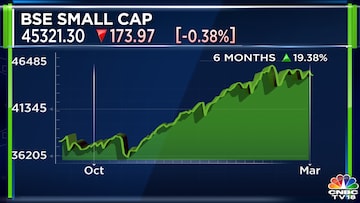
The net inflows into small-cap funds have dwindled for the fourth consecutive month in February. With only ₹2,922 crore of net inflows in the month, a significant drop is visible from previous months' tallies, such as ₹5,472 crore in June 2023, ₹4,495 crore in October 2023, and ₹3,857 crore in December 2023.
Live TV
Loading...
Does this downward trend indicate a cautious investor sentiment?
The numbers suggest a possibility.
Investors seem to be reassessing their strategies and exhibiting a degree of circumspection, possibly in response to recent market volatility and perceived risks, experts say.
More numbers
Delving deeper into the small-cap category mutual fund data provided by Asset Management Companies (AMCs), one can discern insights into fund managers' investment strategies vis-à-vis economic growth and prospects.
"Despite the recent decline in net inflows, the total AUM of small-cap funds have surged by 87% over the eleven months of FY24, soaring from ₹1.34 lakh crore to ₹2.49 lakh crore. This surge is largely attributed to a 61% increase in the Nifty Small Cap index, signifying investors' quest for growth opportunities amid comfortable valuations," Gopal Kavalireddi, Vice-President of Research at FYERS, a brokerage firm, told CNBC-TV18.com.

Analysing the sectoral allocation within small-cap funds' portfolios unveils interesting patterns.
The largest holdings are observed in capital goods (9%), healthcare (8.2%), information technology (7.5%), automobile & ancillaries (7.5%), and finance (6.4%).
As per Kavalireddi, these sectors, especially capital goods, healthcare, and automobile, are witnessing robust growth trajectories, propelled by renewed capital expenditures and heightened discretionary consumption.
"Additionally, sectors like IT and finance present attractive valuations, potentially promising higher returns in the foreseeable future," he said.
However, the recent euphoria surrounding small-cap stocks has also raised concerns regarding excessive valuations.
A stress test on small-cap funds precipitated a swift market correction, with stocks experiencing significant declines ranging from 10% to 30%.
Despite this correction, most AMCs have reported no large-scale redemptions from this category in the first two weeks of March.
"This indicates a degree of resilience among investors," Kavalireddi said.
Investment considerations
While short-term events like general elections, monsoon forecasts, and interest rate fluctuations may induce market volatility, Kavalireddi suggested individuals invest in mid- and small-cap funds over long-term ones for substantial returns.
The efforts from AMCs have also started coming in.
Recently, Motilal Oswal Mutual Fund announced adjustments in the exit load structure of its smallcap fund to manage potential liquidity challenges in the future.
The exit load for both Motilal Oswal Midcap Fund and Motilal Oswal Small Cap Fund now stand at 1% for redemptions made within one year from the date of allotment, as opposed to the previous exit load of 1% for redemptions within 15 days.
ALSO READ | India's oldest ELSS mutual fund has outperformed benchmarks over 1, 3 and 5 years: Should you invest
(Edited by : Amrita)
Note To Readers
The views and investment tips expressed by investment experts on CNBCTV18.com are their own and not that of the website or its management. CNBCTV18.com advises users to check with certified experts before taking any investment decisions.
Check out our in-depth Market Coverage, Business News & get real-time Stock Market Updates on CNBC-TV18. Also, Watch our channels CNBC-TV18, CNBC Awaaz and CNBC Bajar Live on-the-go!


Rapido offers free rides to voters to polling stations on May 13 in Hyderabad, 3 other cities
May 6, 2024 5:49 PM
Lok Sabha elections 2024: Seats to date, all you need to know about third phase of voting
May 6, 2024 4:49 PM
Concerns on low voter turnout a "myth"; absolute number of voters correct way to analyse: Report
May 6, 2024 2:57 PM
Haryana Lok Sabha elections 2024: A look at JJP candidates
May 6, 2024 2:26 PM

